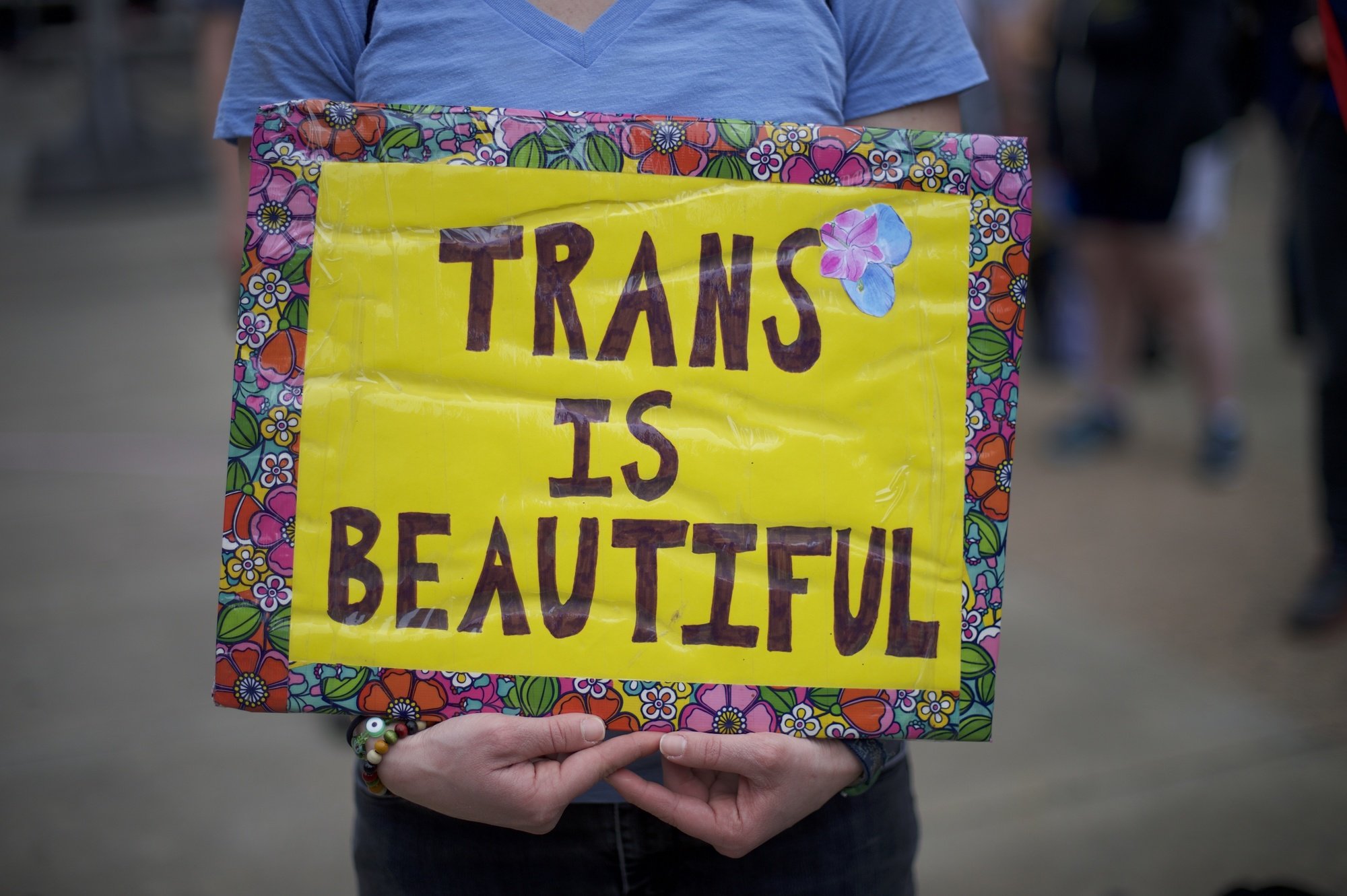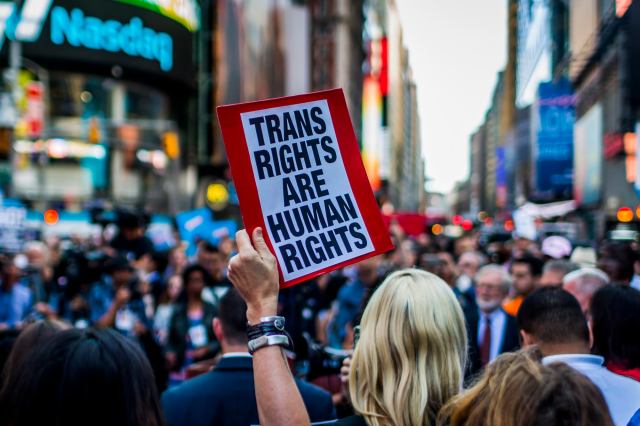Credit: Michael Nigro/SIPA USA/PA Images

In January 2013, the journalist Julie Burchill, angry about the abuse her friend Suzanne Moore had been subjected to on Twitter, wrote a column in The Observer with the heading ‘Transsexuals should cut it out’. Moore, also a journalist, had written a column for the New Statesman in which she bemoaned the pressure on women to be primped and preened, saying that an ideal body shape was often thought of as that of a “Brazilian transsexual”. Cue the deluge of invective.
As is her way, Burchill’s piece in response was rude and offensive. (But ask Burchill to write about an inflammatory issue and you are not going to get a nuanced think piece.) All hell broke loose as soon as Burchill’s piece went live, with transgender activists and their allies demanding the editor who commissioned the piece resign and calling for the column to be taken offline.
The column was withdrawn the following day and a placatory statement, largely a retraction and grovelling apology, issued by the editor. The Reader’s Editor also wrote 1,300 words of apology, which was far longer than the bothersome column. That same week, more than 100 trans rights protesters turned up to the newspaper’s offices with placards and loudhailers, clearly not even slightly appeased.
This is their standard reaction to any attempt at the slightest critical discussion of the issue. So it’s no wonder that editors in print, radio and television are far more frightened of being accused of ‘transphobia’ than they are of upsetting the rather quieter feminists – myself included – who take issue with the trans notion of gender being innate, and male and female brains being distinct.
Will you allow me to explain? Transgender theory centres on the idea that there is something inherent about ‘male’ and ‘female’ characteristics. Whereas feminists argue that gender is merely a social construction[1. In my opinion, though, being a woman is not just a ‘feeling’ as some transgender activists have argued Growing up as a girl, being made to feel inferior to boys, suffering the fear and the reality of endemic sexual violence and exploitation, it all has a profound effect. And we women are oppressed by sexism, not biology – our biology, however, is used as an excuse used to justify discrimination], the transgender line is that girls and boys are born hardwired to like either pink or blue and so if a boy wants to dance around in his mother’s shoes and prefers pink, he was clearly born in the wrong body. Admittedly this is a rather reductive description of the two arguments, but I would say a fairly accurate one.

So, to return to the everyday censorship of my opinion, when former boxing promoter Kellie Maloney came out as transgender in 2014, transgender activist and journalist Paris Lees argued that Maloney had not “become” a woman but had “always been a woman”. Since I was known to have a different view, I was invited on to Newsnight to take part in a discussion about what it means to “identify as a woman” alongside Lees and a trans man.
I declined, explaining that I would rather be drinking wine and relaxing at home than be accused of fascism on live TV. Every feminist whom Newsnight approached said more or less the same thing and in the end Miranda Yardley, a trans woman who speaks out against the bullying and abuse by some trans activists towards feminists, agreed to take part.
But when Lees discovered that Yardley was also a guest, she walked out, followed by the trans man and the item was subsequently pulled from Newsnight. Meanwhile, the producer who had spent all day trying to book guests was subjected to horrendous abuse on social media for simply inviting commentators to take part in a respectful debate on the issue of what it means to be a woman.
Thus was the whole debate shut down. Nor was it an isolated occurrence.
A few years ago several feminists, including myself, were contacted by a journalist from a liberal newspaper asking for detailed interviews for a feature on “the war between trans women and radical feminists”. An equal numbers of trans women were also interviewed. But the article never ran. According to a reliable source, the editors decided it would be too much trouble to publish a piece on the issue, no matter how balanced it was. “Unless it is a piece in total support of transgender issues, with no dissenting voices, the complaints just get to much to handle,” I was told.
These days, I’m not even allowed to write off-topic. In 2014, I was writing a book on the lesbian and gay movement and asked the editor of a gay website if he would publish a survey aimed at gay men to enable me to find out about issues relating to anti-gay bigotry. He readily agreed and was ready to publish a 500-word piece to accompany the survey. Mysteriously, neither article nor survey ever appeared. It transpired a trans woman had warned the editor not to publish my work.
Other writers are similarly tainted. Janice Raymond is a feminist academic and the author of The Transsexual Empire, the very first feminist analysis of the issue back in 1979. Also an expert on the sex trade, Raymond sent an article on why prostitution should not be viewed as ‘work’ but as abuse of women to a publication to which she regularly contributes. It was not published. “The editor was asked by another writer why they had not published the article,” says Raymond. “They told her that they had received accusations claiming I was transphobic.”
Unsurprisingly, most of the writers and editors I contacted for a quote insisted on being off the record, for fear that they will be blacklisted from publications if identified. All told me similar things: that whenever there is an even vaguely critical article written by a woman about transgender theory, there are huge, vicious attacks on social media and hundreds of emails and telephone calls to the editor.
The documentary, which explored both sides of the argument about whether or not to except a self-diagnosis for very young children regarding gender dysphoria, was the subject of a petition and hundreds of complaints from transgender people and their allies prior to its screening. The petition demanded that the documentary be pulled for fear that it would “cause harm” to transgender children and adults.
Filmmaker John Conroy was accused on social media of producing “very biased and transphobic propaganda”. He responded that he simply wished to “discuss alternative viewpoints without censorship”.
One freelancer, who I shall call ‘Claire’, writes about what can be broadly termed ‘women’s issues’. “One [feminist] publication was in financial trouble and asked previous writers to contribute for free, telling them that this meant they could write on ‘anything you want, perhaps something that you wouldn’t be able to get published elsewhere’” Claire tells me. “So I sent something on trans politics and the right of women to have linguistic and physical boundaries, but was then told by the editor that they couldn’t publish it after all.” She wrote a similar piece for a socialist publication.
The editor was initially fine, she said:
“But, then suddenly a trigger warning and disclaimer were added following a petition being set up in response to the article. I withdrew the piece then as I just couldn’t accept trigger warnings being used to suggest things I write are harmful or discriminatory.”
Alice, too, was censored. “I’ve had one major article spiked. The editor who spiked it was initially very keen to cover the subject and approved my approach – an article about what gender is – but after I filed the first draft she told me she’d received complaints from trans activists about me writing on the subject, and then asked if I could produce something ‘more about what it’s like to be trans’. Obviously that wasn’t the article I’d been commissioned to write and it’s not an article I could write.”
Alice adds:
“The space to talk about these issues from a feminist perspective is really constrained. A lot of places wouldn’t even consider a pitch with a gender critical angle, or in some cases, a writer associated with gender critical work, while some fairly specious stuff and some outright abusive stuff, from a pro-gender identify perspective gets published very regularly.”
One person who did agree to be named is Helen Lewis, Deputy Editor of the New Statesman. Lewis recognises that some coverage of transgender issues has been “cruel and sensationalist”, but has also noticed some double standards. “The relatively few men who write on these issues, or comment on them on Twitter, seem to attract a lot less flak than women do,” she observes:
“No one is exempt from perpetrating sexism and it feels to me as though a small group of activists, ironically, most of whom are not transgender themselves, have dragooned this issue into an on-going culture war. That crowds out the possibility of measured disagreement and compromise.”
As we saw with the decision by the Observer editor to remove a column that had caused offence, the McCarthyite hounding and bullying of editors who attempt to present a nuanced point of view about the transgender issue is enough to deter the majority from doing so. But surely such stark statements as ‘trans-women are women’, and ‘gender non-conforming children are showing signs of transgenderism’ need to be scrutinised and challenged. And the move towards men being able to self-identify as women has consequences that need to be discussed.
Who, though, is brave enough to give a platform for the other side of the argument? At the moment, some are allowed to speak, and others are actively being silenced. What is this Orwellian nightmare our news media has enabled?










Join the discussion
Join like minded readers that support our journalism by becoming a paid subscriber
To join the discussion in the comments, become a paid subscriber.
Join like minded readers that support our journalism, read unlimited articles and enjoy other subscriber-only benefits.
Subscribe